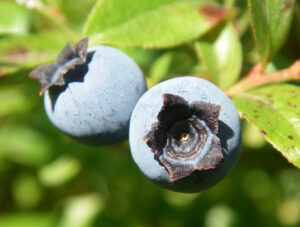Helping Maine Farmers Succeed in a Changing Climate
 Institution: University of Maine
Institution: University of Maine
Sponsor: Senator George J. Mitchell Center for Sustainability Solutions
University of Maine Cooperative Extension members and the State Climatologist are working on a new project with farmers in Maine. The goal is to listen to farmer needs around weather information and farm management decision support tools, and discuss future capabilities in light of Maine’s changing climate.
The project aims to make progress towards providing site-specific temperature, precipitation, frost and heat-stress warnings, cloud-cover/sunshine, evapotranspiration, and soil moisture forecast and observation values for locations in Maine. The apple, wild blueberry, and potato industries already have crop-specific weather stations. Through the project, the team expects to gain a better understanding of how these crop-specific weather stations can be combined with NOAA gridded weather data to serve more farms in Maine.
The project will feature three farmer focus groups including apple, wild blueberry, and mixed vegetable in addition to a short survey on weather tool use implemented at summer 2019 events. Each focus group will be comprised of six to eight farmer volunteers who represent different perspectives within each commodity, such as large, small, conventional, and organic.
Focus groups will meet with the project leaders and students in the fall/winter of 2019/2020 to discuss farmer needs around weather information and weather-based crop and pest models. Importantly, each commodity group will meet three different times with project leaders allowing the team to listen to farmer needs, discuss possible solutions, and then come back to the same group of farmers for feedback and re-working.
Through this collaborative effort, the team intends to build relationships between Maine farmers, UMaine Extension, and the Climate Change Institute to assist with farm management decisions.
Project Update (July 2020)
This project has leveraged the team’s established relationships with wild blueberry, apple, and mixed vegetable farmers by engaging farmers in focus groups. Through these focus groups, they are currently identifying, developing, and documenting Maine farmer needs and priorities regarding weather information, services, and farm management decision support tools.
Results from these focus groups reveal a large gap in the capacity of current weather data availability, quality, and communication to meet the needs of Maine growers. Although some respondents do not have access to the internet, many who use web-based weather platforms desire greater accuracy and localization. All three grower groups concluded that there is an immediate need for a customizable “central resource”, where farmers of many crop commodities can retrieve reliable weather information in addition to pest and crop forecasting models. A GDD (Growing Degree Day) source online would aid growers in monitoring crop development and field-based decisions. Growers would also like to be able to access historical weather data and have improved frost prediction. This “central resource” would be online and mobile friendly, simple and intuitive to use, and customizable.
In an effort to move forward, the team has increased the number of gridded weather data collection sites in Maine to include wild blueberry and mixed vegetable fields in addition to apple orchard sites. The team created an Agricultural Weather page of the Maine Climate Office called AgEye Weather. They also added a GDD to the existing wild blueberry AgriNet weather tool website.
Team Leader:
Lily Calderwood, Extension Wild Blueberry Specialist and Assistant Professor of Horticulture
Team Members:
- Sean Birkel, Maine State Climatologist, University of Maine Research Assistant Professor, Climate Change Institute
- Glen Koehler, Associate Scientist Apple IPM, University of Maine Cooperative Extension
- Erin Roache, Crop Insurance Education Program Manager, University of Maine Cooperative Extension
